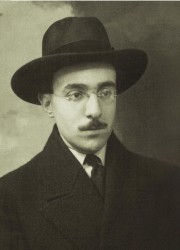
Tabucchi loves Lisbon, the film director Wenders loves Lisbon, and I much like Lisbon: the sweet urban decadence of it, the formidable Atlantic ocean of it making it Europe’s last vestige on the southern flank, but also an easy, open way to the new world, as far as the immensely flowing Amazon.
A city in a nation well positioned for potential greatness, but Portugal still needing to be represented in the international literary canon with its only available candidate at one point, the poet Fernando Pessoa it seems. A chap through his compositions and spiritual meanderings contributing to its name, ironically named pessoa, meaning person in Portuguese, yet a man cleverly made up of many personae, writing as three completely different bards, in thought, in style as well as in background, not dealing much with human essence in historical context, more apt to make this up.
A man as fragmented as his personifications causing that in the end it is not the work that is the man, but the man who is the work. And I have some difficulty with this, because as lovely as he could write, is this really genius? Yes, I do confess having ambivalent feelings about Pessoa’s craft, finding the stream of consciousness in his Book of Disquiet and other works beguiling, but in the end also very disconcerting and somewhat out of control. While others rave about it, I find it a four dimensional rave, at times becoming tiresome. But then am I perhaps too sober for high-minded, literary schizophrenia of the sort?
Unlike contemporaries like his fellow cosmopolite Kazantzakis of Greece or Joyce of Ireland, Pessoa lacks the cohesive, comprehensive body of their work. As a linguistic polyglot due to a partial South African upbringing able to and becoming an almost Atlantic critic and poet, he desperately identified and followed every foreign literary trend, while claiming ‘solitude devastated him, company oppressed him, the presence of another person derailing his thoughts, dreaming of the other’s presence with a strange absent-mindedness that no amount of analytical scrutiny could define etc etc’, and yet, go figure, still being that very public Lisbon Café Society plum.
And isn’t all scrutiny analytical, or it wouldn’t be scrutiny?
A literary omnivore and chameleon, exotic to some, admired by many, but with a complex I say, adding to Portuguese letters less with words than with presence, a dandy seeking to fascinate, always looking abroad, and gaining attention and approval incidentally while hopelessly over-compensating towards his aim.
Still Pessoa, while sometimes a pesa’o, seems to have had a developed sense of humour and when he writes ‘A firefly flashes forward at regular intervals. Around me the dark countryside is a huge lack of sound that almost smells pleasant.’ why don’t we help him crack a smile and ask ‘the countryside almost smells ‘peasant’?
A new, major Portuguese literary talent is long overdue.
Saramago was not enough!
Leave a Reply
You must be logged in to post a comment.